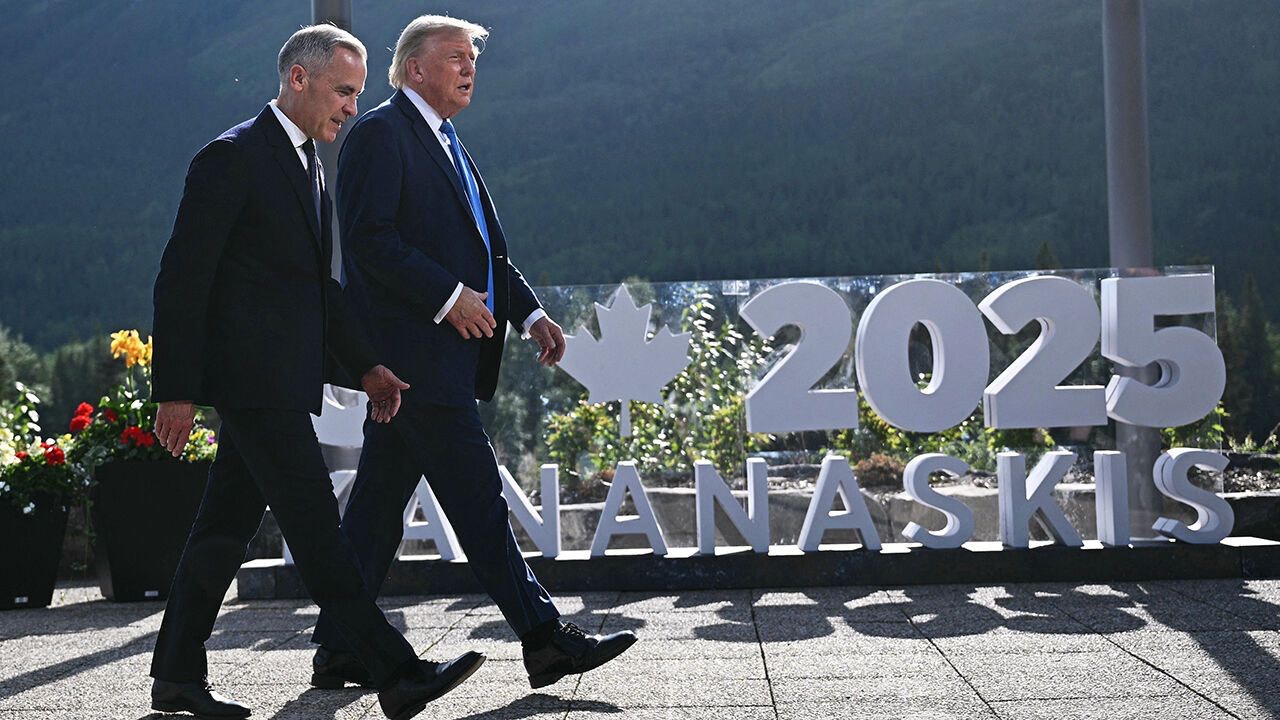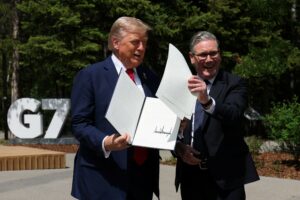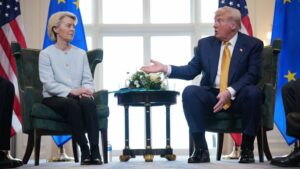Written By Thomas Gregory, Posted on August 4, 2025

By Thomas Gregory
Back in April, I wrote an article about the Canada–U.S. trade relationship and how the issue was being discussed on Canadian university campuses. In that piece, I pushed back against the escalatory sentiment dominating the minds of most professors and students regarding President Trump’s tariffs. My goal was to highlight a broader phenomenon, namely, the intellectual conformity and media-driven groupthink present in Canadian academia.
To summarize, Canadian universities have sadly devolved into environments devoid of open debate or intellectual honesty. They’ve become echo chambers that reinforce the delusions spoon-fed to the public by outlets like CTV, Global, and the perpetually repugnant CBC. The following episode of Open College with Dr. Stephen Hicks explains what many of us are experiencing on campus.
In the current situation, those delusions have metastasized into a smug belief that we’re somehow entitled to unfettered access to the U.S. market regardless of how we behave as an ally or how much disrespect we show to the United States. That belief has directly contributed to the kind of escalatory policies that hurt Canadians and undermine our ability to secure a fair trade deal.
While I said much of this back in April, I’m revisiting the issue now for two reasons. First, since that article, the Canadian election has wrapped up and, unfortunately, handed a mandate to Mark Carney’s Liberal Party. That means negotiations with the U.S. have continued since I last wrote. Second, it’s now summer break. Instead of being surrounded by students, I’m working a union job alongside coworkers from a completely different demographic, many of whom have vastly different life experiences than your average undergrad. You’d expect their perspectives on trade and foreign policy to reflect that. They don’t. And that’s what prompted me to expand my argument.
Originally, I claimed that public opinion in the classroom is shaped by the media, reinforced by professors and teaching assistants, then absorbed by students. My recent experience suggests something deeper: the pipeline of ideological conformity extends far beyond the classroom. In fact, it pervades Canadian discourse at large. More accurately, public opinion in Canada is set by the media and reinforced by social pressure, specially from authority figures. The issue I described in my first article is not limited to academia; it’s symptomatic of a broader, more troubling national condition. Academia just happens to be the most obvious example.
This became painfully clear during a recent conversation with a coworker. I had mentioned that I’m still attending university, and during lunch, they asked what I study. When I said political science and history, they immediately brought up the trade issue and declared that Trump and the U.S. more broadly need to “respect Canada more and stop bullying us.” Their reactionary, programmed response was concerning almost as if they had been conditioned to react in this manner.
I agreed that Trump’s tone could be less abrasive (a point they accepted), but I added that Canada’s refusal to make concessions paired with our own escalation wasn’t helping either. I argued that while Trump’s behaviour may be imperfect, Canada’s behaviour is also far from ideal. If we want a fair trade deal, we can’t act however we please simply because we believe Trump’s tariffs are unfair.
In response, they dismissed my point, claiming it wouldn’t matter what Canada does because Trump is evil, acting without reason, and would never cooperate anyway. An assumption that seemed to be programmed into them.
I’ve already explained in my previous article why this “for no reason” narrative is inaccurate, but it’s worth examining the assumption that Trump would never cooperate with Canada even if we offered concessions. In my view, that kind of claim is deeply flawed. It’s intellectually weak to make absolute assertions without definitive evidence and ironically supporting evidence is something universities used to demand, at least from my understanding of history. The assumption that the Trump administration would not negotiate in good faith is best tested by examining Trump’s past behaviour with other nations.
The United Kingdom and the Trump administration had similar trade grievances, particularly regarding tariffs on U.S. agricultural and industrial goods. The United States responded with tariffs similar to what Canada is currently facing. So how did the U.K. respond? They lowered or eliminated the tariffs Trump opposed and restructured quotas to favour American companies. What was the payoff? The U.S. cut tariffs on U.K. steel and aluminum entirely and slashed auto tariffs from 27.5% to 10%.

Some might argue that the U.K. is just one example and not enough to justify a diplomatic strategy. However, a weak counterpoint doesn’t make for a legitimate argument. The U.S.–U.K. trade agreement that resulted from ongoing negotiations is not an outlier. Throughout both of Trump’s terms, his tariff policies consistently included a willingness to renegotiate trade agreements as long as the other country showed a willingness to make reciprocal concessions. Trump isn’t against trade; he’s against trade imbalances, something he repeated ad nauseam on the campaign trail. There are numerous examples to support that claim, including deals with the EU, Japan, the U.K., and now even Pakistan. All demonstrate that diplomacy works when both sides are willing to bend.
Given that the U.K.’s concessions resulted in reduced or eliminated tariffs, it logically follows that Canada facing similar issues, would likely see the same outcome if we offered comparable concessions. However, since Trump has been turned into Canada’s political boogeyman by our media and political class, we continue engaging in mental gymnastics to convince ourselves he’s impossible to negotiate with. This, despite a lack of evidence supporting that belief and a mountain of evidence to the contrary. It’s not the U.S. that’s being unreasonable. It’s us. A textbook case of projection.

If this were just the misguided view of a few outliers, it would be bad enough. But this line of thinking is widespread. The media narrative genuinely reflects the dominant view among Canadians from academics to unionized workers. Worse still, this anti-rational mindset is precisely what’s shaping our national policy under Prime Minister Mark Carney’s Liberal government.
When I first revisited this issue, Canada was cozying up to the U.K. and the EU. Around the same time, the government proposed a Digital Services Tax targeting the U.S. They quickly walked it back after Trump tweeted that he’d hike tariffs on Canadian goods. He later followed through, announcing an increase from 25% to 35% on most Canadian exports except energy, which remained at 10%.
This outcome underscores everything I’ve been arguing: our escalatory posture endorsed by the media, politicians, and the general public is a losing strategy. Contrast that with Alberta Premier Danielle Smith’s approach. She’s the only figure in Canadian politics who engaged in any sort of meaningful diplomacy, which directly contributed to the lower tariff on energy. While I have my criticisms of Premier Smith, it’s a simple fact that her actions were productive. More Canadian politicians should take note.
For now, there appears to be no further escalation from the Canadian side, but Carney is visibly panicking even as he claims a deal will be in place before August 1st. Trump, on the other hand, has made it clear he believes a deal is unlikely based on Canada’s current posture and who can blame him? Nothing has changed. The alcohol bans across provinces remain, propagandistic “Buy Canadian” posters are everywhere, and the media continues to relentlessly demonize Trump. All of these factors erode the goodwill needed to strike a deal.

It’s likely the Canadian government will continue to drag its feet, doing the bare minimum while riding the wave of nationalistic hype that swept Carney into office. I’d love to be proven wrong, but based on what I’ve seen so far, I doubt we’ll grow out of this self-destructive attitude at least not while a Republican is in the White House. If Carney somehow pulls off a fair trade deal, it’ll be by doing exactly what I’ve been advocating since April.
If we want a trade policy that benefits Canadians, we must outgrow this cultural and political mindset. It’s poisoning our economy, and groupthink has made honest discussion on the issue virtually taboo from classrooms to job sites. We need to acknowledge, as a country, that we control how we respond to these problems; right now, we are responding poorly.
Compared to how other nations have resolved trade disputes with the U.S., our strategy is embarrassingly counterproductive. Until we adopt a more diplomatic and open posture, there won’t be a deal. And unless we break free from the media-driven echo chamber that dominates our national psyche, things will only continue to deteriorate.
History & Political Science — TMU Independent political journalist; Former Candidate New Blue Party of Ontario
Very well presented. Every quote was awesome and thanks for sharing the content. Keep sharing and keep motivating others.